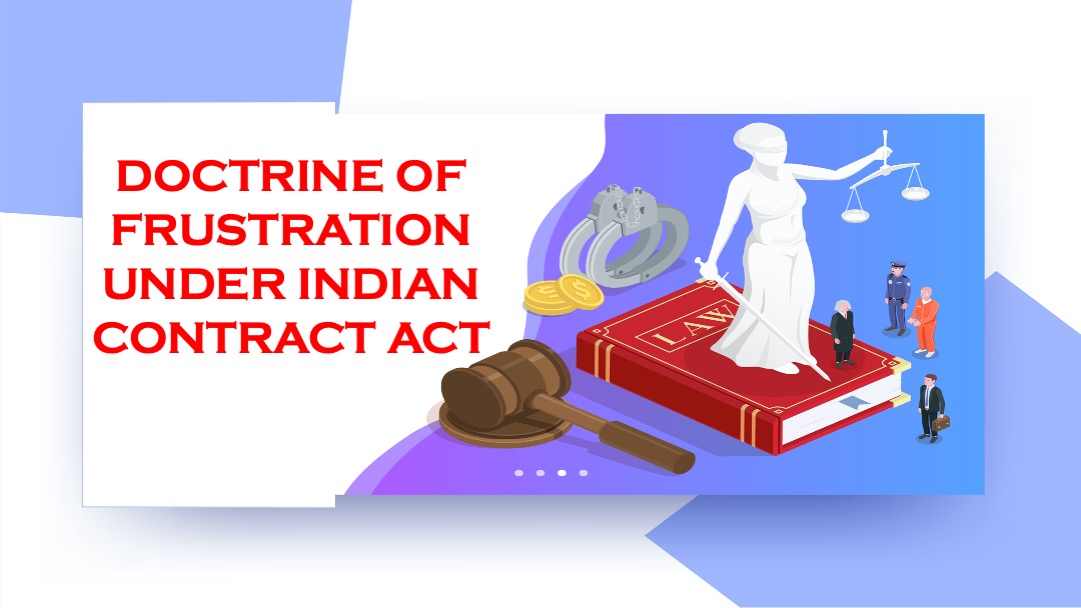The Doctrine of Frustration is a legal principle under the Indian Contract Act, which provides for the discharge of a contract in certain circumstances when an unforeseen event occurs that renders the performance of the contract illegal OR impossible.
Definition of the doctrine of frustration
Section 56 of the Indian Contract Act, of 1872 states that a contract will be considered frustrated if it becomes impossible or unlawful to perform due to an event that was beyond the control of both parties. The event must be such that it was not foreseeable or anticipated by the parties at the time of entering into the contract.
Some examples of events that may trigger the Doctrine of Frustration include war, natural disasters, sudden changes in law, death or illness of a party, or destruction of the subject matter of the contract.
A contract is automatically terminated and the parties are released from their obligations when it is frustrated. The parties are not liable for any damages or losses arising out of the non-performance of the contract.
It is important to note that the Doctrine of Frustration is a narrow and limited principle, and the event in question must be truly exceptional and unforeseeable to apply. If the contract provides for contingencies or events that may occur in the future, the Doctrine of Frustration may not apply.
The doctrine of Frustration is based on the principle that a contract may be discharged if an unforeseen event occurs that renders the performance of the contract impossible or illegal.
However, there are different ways in which the Doctrine of Frustration may apply to different types of contracts. For example, in contracts for the sale of goods, frustration may occur if the goods are destroyed or lost before delivery. In contracts for the performance of services, frustration may occur if the person providing the services becomes incapacitated or dies.
There are also certain conditions that must be met for the Doctrine of Frustration to apply. The event that causes the frustration must be beyond the control of the parties and not foreseen at the time of entering into the contract. Additionally, the event must make the performance of the contract impossible or illegal, and it must not be due to the fault or negligence of either party.
historical judgment:
Some notable cases in which the Doctrine of Frustration was applied in India include:
Satyabrata Ghose v. Mugneeram Bangur & Co (1954)
Satyabrata Ghose v. Mugneeram Bangur & Co is a landmark case in Indian law that dealt with the concept of frustration of contract. The case was decided by the Supreme Court of India in 1954.
Satyabrata Ghose had signed a contract with Mugneeram Bangur & Co for the supply of jute. The contract contained a clause that stated that the goods would be shipped from Calcutta port. However, due to political unrest in Calcutta at the time, the government prohibited the shipment of goods from the port. As a result, the contract could not be performed as agreed upon.
Satyabrata Ghose sought to recover damages from Mugneeram Bangur & Co for breach of contract, while Mugneeram Bangur & Co argued that the contract was frustrated due to the government’s prohibition on shipment.
The Supreme Court of India held that frustration with a contract occurs when an event occurs that makes the performance of the contract impossible or radically different from what was agreed upon by the parties. In this case, the government’s prohibition on the shipment of goods from Calcutta port constituted an event that made the performance of the contract impossible, and thus the contract was frustrated.
The court also held that when a contract is frustrated, the parties are discharged from further performance of the contract, and the law implies a term to that effect in the contract. The court further held that the party who has paid money under a frustrated contract is entitled to recover it, subject to any expenses incurred by the other party before the frustration occurred.
This case is significant because it established the legal principle of frustration of contracts in India and provided guidance on how to deal with contracts that are frustrating. The case also recognized the rights of parties who have paid money under a frustrated contract and established the basis for the calculation of damages in such cases.
Taylor v. Caldwell (1863)
This is a landmark case in the UK where the Doctrine of Frustration was first applied. The court held that a contract for the hire of a music hall was frustrated when the hall was destroyed by fire before the date of the performance.
Krell v. Henry (1903)
In this case, the court held that a contract for the hire of a room with a view of the coronation procession was frustrated when the procession was canceled due to the king’s illness. The court held that the main purpose of the contract was to provide a view of the procession, which had become impossible due to the cancellation.
These cases demonstrate the importance of the Doctrine of Frustration in contract law and how it may be applied in different situations.
CONCLUSION
In conclusion, the Doctrine of Frustration is an important legal principle under the Indian Contract Act that allows parties to be released from their contractual obligations in certain exceptional circumstances beyond their control.

























